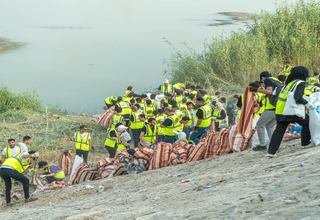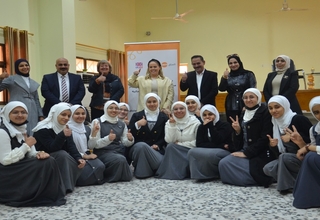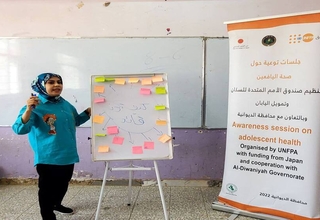UNFPA aims to increase the capacity of the Ministry of Health and civil society organizations to deliver integrated quality reproductive health services that meet the needs of vulnerable populations, especially those in humanitarian settings.
This output is linked to Outcome 1 of UNFPA’s Strategic Plan and contributes to the UNDAF outcome: Targeted government institution capacities strengthened for accountability, transparency, and provision of equitable and quality services. The output also contributes to the National Strategic Plan priority of Human and Social Development.
Under this programme output comes; advocacy and policy dialogue, capacity development, knowledge management and service delivery as a part of humanitarian response shall be the main modes of engagement. Strategies for achieving the output will be the following:
a. Increasing the coverage and referral system of basic and comprehensive emergency obstetric and neonatal care services;
b. Increasing coverage of family planning services for populations affected by emergencies;
c. Developing protocols, guidelines and policies on sexual and reproductive health;
d. awareness-raising on sexual and reproductive health;
e. Improving the logistics management information system for a better reproductive health commodity security; and
f. Strengthening youth-friendly services tailored to the needs of young people affected by emergencies.
Major activities:
Increasing the coverage and referral system of basic and comprehensive emergency obstetric and neonatal care services;
• Conduct regular assessments in selected hospitals and maternities in crisis-affected and returnees areas to identify capacity gaps
• Provide medical equipment, supplies and personnel to support quality delivery of EmONC in PHCs and hospitals in selected conflict-impacted districts
• Develop skills of health workers on EmONC
Increasing coverage of family planning services for populations affected by emergencies;
• Develop skills of health care providers on FP method mix and counselling
• Provide medical equipment, commodities, supplies and personnel to support quality delivery of FP and RH services in selected camps and PHCs.
Developing protocols, guidelines and policies on sexual and reproductive health;
• Develop and promote RH/MCH decentralised plans and their costed action plans for improving EmONC
• Support national and international meetings to guide development and review of protocols, policies and guidelines
• Adapt and adopt ICM curricula to meet the needs of Iraq
• Disseminate EmONC needs assessment report for policy dialogue
Awareness-raising on sexual and reproductive health;
• Upgrade skills of health workers on RH promotion approaches
• Create SRH awareness through women centres and outreach activities.
Improving the logistics management information system for a better reproductive health commodity security;
• Conduct advocacy for third party procurement of RH commodities with funding from Ministry of Health
• Develop skills of health workers on Logistics Management Information System (LMIS) and other Reproductive Health Commodity Security (RHCS) issues
Strengthening youth-friendly services tailored to the needs of young people affected by emergencies;
• Conduct an assessment of the existing youth friendly health services (YFHS) in selected PHCCs
• Scale up YFHS to among other PHCCs
• Support integration of YFHS into other health programme
UNFPA Partners: Ministry of Health, Ministry Education, Ministry of Higher Education and Scientific Research, Kurdistan Regional Government, Non-governmental organizations, Media, World Health Organization, United Nations Children’s Fund



